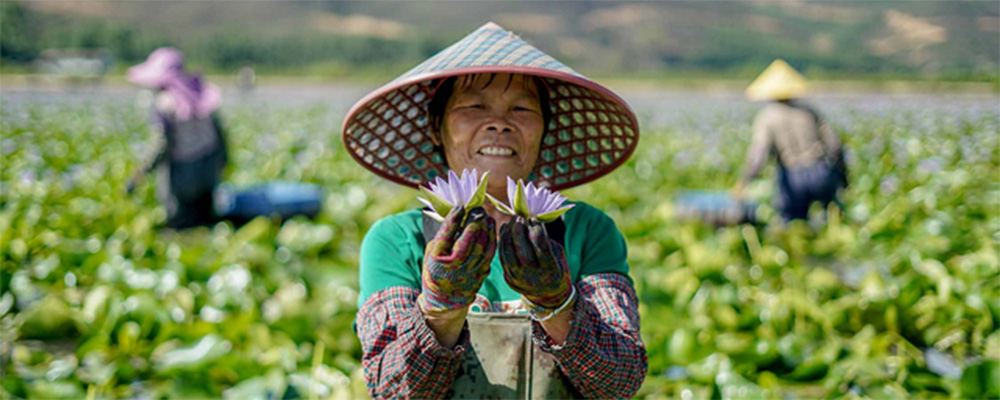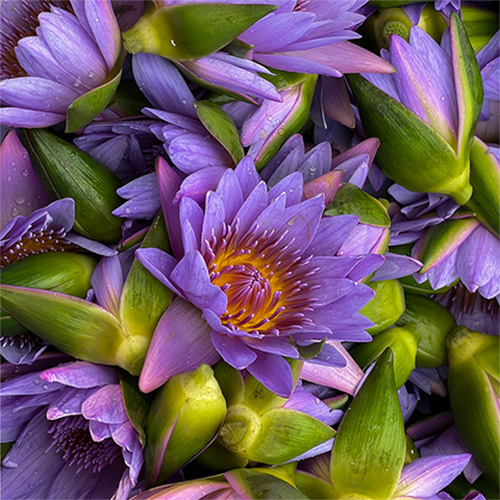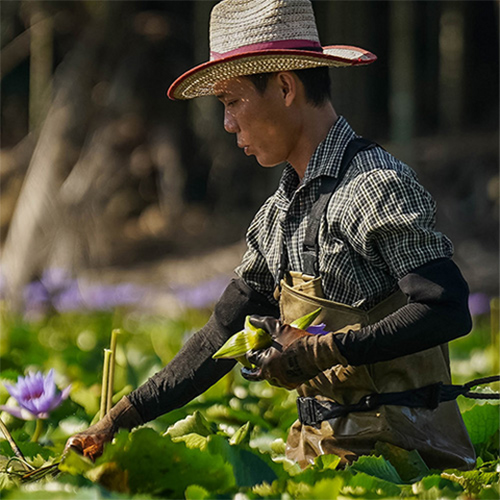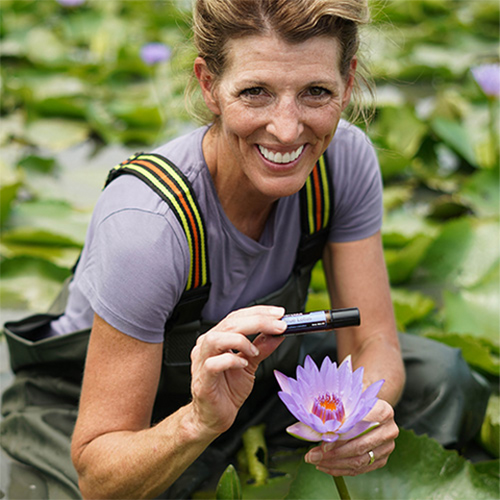Origin: a Latin derivative
meaning "Gift of the Earth."
Behind the Bottle: Sourcing Blue Lotus

Nymphaea caerulea, or Blue Lotus Flower, is a blue-purple water lily with a bright yellow center. It requires hot,
humid
weather to grow and is native to parts of Asia where it holds historical and cultural significance to the
communities
where it grows. Blue lotus flowers remain closed when it’s dark or cloudy, only blooming when the sun appears in the
morning.

Behind the Bottle
doTERRA Blue Lotus is sourced from Guangzhou, Guangdong Province, China and Haikou, Hainan Island, China. While the plant grows wild in these areas, our blue lotus is grown and harvested in cultivation ponds with new seedlings being nurtured alongside the more mature flowers to ensure continuous health and supply of flowers. After about three to four months of growing in the pond, the blue lotus will bloom, enabling approximately three to four harvests per year, which usually take place between March and November.
In Guangzhou, the blue lotus ponds were built entirely from scratch, specifically to source Blue Lotus for doTERRA. The undertaking was led by a husband-and- wife duo who also produce several other oils for doTERRA from this area of the world. All of the flowers from the Guangzhou ponds are used to create doTERRA Blue Lotus Touch.
In Haikou, blue lotus ponds already existed for the fresh flower market, however our partner helped this pond to
expand.
Here, 30% of the flowers are now used for doTERRA Blue Lotus while 70% of the flowers still go to the flower
market.
The
income farmers receive from the flower market can vary quite a lot in stability, making the addition of Blue
Lotus
extract production a great source of reliable, consistent revenue for local farmers.

Caring for the plant is labor intensive with men and women farmers working in waist-high water to reach them. Fish living in the pond are regularly checked to determine the cleanliness of the water. Since the ponds are pesticide free, harvesters manually remove snails who can invade the water, lay eggs and start eating the leaves. In Guangzhou, they also use the distilled biomass of camellia flowers in the ponds as a natural way of reducing infestation of snails.
When it’s time to harvest, the farmers bring floating baskets with them into the ponds to collect the flowers. Harvesters can usually collect up to 220 lbs. (100 kg) of flowers per day and are paid immediately via bank transfer based on the weight. Once harvested, the flowers are stored in a cool room and transported in a refrigerated truck to the extraction facility within 24 hours of harvest. After extraction, the leftover biomass is used as mulch for litsea trees, which also provide essential oil for doTERRA.


Impacting Lives
To provide Blue Lotus Touch, doTERRA has developed a Co-Impact Sourcing® partnership to ensure traceable, sustainable, and transparent supply chains that produce the best quality product. Through this partnership, 22 blue lotus farmers and laborers receive income. In Guangzhou, the landowner received (and continue to receive) prepayments to support the expansion of their lotus production ponds which provides cash flow to pay their upfront costs rather than waiting for full payment after harvest.
The expanded lotus pond in Hainan allows farmers who previously sold the flowers for the fresh market alone to expand their business producing flowers for extraction—guaranteeing a reliable and sustainable supplemental income. The newer lotus pond set up in Guangzhou has generated job opportunities for the local community including many women who have learned new skills that support their livelihoods and provide a pleasant work environment. Furthermore, with the retirement age being 55 years old for women, this supply chain allows additional income for their families. This produce supports 92 jobs, impacting 285 lives.
In one of the small villages where many of the blue lotus farmers live, many farmers often must leave to work in bigger cities to sufficiently provide for their families, only returning to visit their families once a year. By working with doTERRA, farmers can earn enough income in their hometown to stay to provide for their families.



